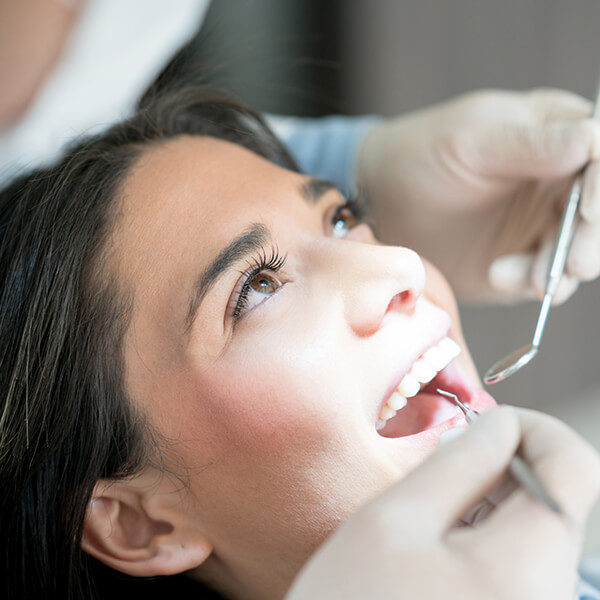How to Prevent Gum Disease in Mays Landing, NJ
Enjoy thorough and gentle cleanings.

Protect Your Oral Health With Personalized Gum Disease Treatment and Prevention Tips

Maintaining good oral health is essential for overall well-being, and it all starts with healthy gums. Gum disease, also known as periodontal disease, is a common condition caused by the buildup of plaque and bacteria on the teeth and gums, which can lead to inflammation, infection, and damage to the supporting structures of the teeth.
If left untreated, periodontal disease can result in tooth loss, systemic infections, and other serious health problems. Therefore, understanding the signs, causes, and treatments of gum disease is crucial for maintaining healthy gums and a healthy smile.
Our Mays Landing, NJ, general dentist wants to ensure your oral health is in excellent condition. To schedule an appointment, contact Advanced Cosmetic and General Dentistry today by calling (609) 625-3499.
Choosing Dr. Nosti For Your Dental Care
When it comes to preventing and treating gum disease in Mays Landing, NJ, Dr. John Nosti brings years of experience and a patient-centered approach to oral health care. At Advanced Cosmetic and General Dentistry, we develop personalized treatment plans that address your specific risk factors and oral health goals, utilizing state-of-the-art technology and evidence-based treatments for optimal results.
Our practice emphasizes patient education and open communication in a comfortable, welcoming environment where Dr. Nosti takes the time to answer all your questions and ensure you understand both your treatments and how to maintain excellent oral health at home between visits.
Causes of Gum Disease
There are several potential causes for gum disease, including:
- Poor oral hygiene habits, such as infrequent brushing and flossing
- Tobacco use, including smoking and chewing tobacco
- Genetics and family history of gum disease
- Hormonal changes, such as during pregnancy or menopause
- Certain medications, such as blood pressure medications, antihistamines, and antidepressants
- Health conditions, such as diabetes or HIV/AIDS, that compromise the immune system
- Poor nutrition
- Aging
- Teeth grinding and clenching
Tips for Preventing Gum Disease
Practice Good Oral Hygiene
The best way to prevent periodontal disease is to practice good oral hygiene habits. This includes brushing your teeth at least twice a day with fluoride toothpaste, flossing daily, and using an antibacterial mouthwash. You should also visit your local dentist for regular checkups and professional cleanings twice a year.
Quit Smoking
Smoking is a major risk factor for gum disease. If you smoke, quitting is one of the best things you can do for your oral health. Smoking weakens the immune system, making it harder for your body to fight gum infections.
Limit Your Sugar Intake
Eating a diet high in sugar can increase your risk of periodontal disease. Sugar feeds the bacteria in your mouth, leading to the formation of dental plaque and tartar. To prevent gum disease, limit your intake of sugary foods and drinks and choose healthier options like fruits, vegetables, and whole grains.
Visit Your Dentist Regularly
Regular dental cleanings and checkups are essential for preventing gum disease. Your dentist can detect early warning signs of gum disease and provide treatment before it becomes more serious.
Consider Treatments
If you’re at a high risk of developing periodontal disease, your dentist may recommend additional treatments to prevent it. These treatments may include professional dental cleanings, scaling and root planing, or antibiotic therapy.
Use a Water Flosser
A water flosser is a device that uses a stream of water to clean between your teeth and along the gum line. It can be helpful for people who have trouble flossing with traditional dental floss. Using a water flosser can help remove plaque, prevent tooth decay, and reduce other risk factors of gum disease.
Manage Stress
Stress can weaken your immune system and make it harder for your body to fight infections, including gum disease. To prevent gum disease, try to manage your stress levels by practicing relaxation techniques like deep breathing, meditation, or yoga.
Children and Gum Disease Prevention
While gum disease is more commonly associated with adults, children can also develop early forms of periodontal problems, making prevention crucial from an early age. Teaching children proper oral hygiene habits sets the foundation for lifelong gum health and can prevent serious dental issues in adulthood.
Age-Appropriate Oral Care
For toddlers and preschoolers, parents should brush their children’s teeth twice daily with a soft-bristled toothbrush and fluoride toothpaste (rice-grain-sized amount for children under 3 and pea-sized for ages 3-6). Gentle circular motions along the gum line help remove plaque without irritating sensitive gum tissue. Flossing should begin once teeth start touching, typically around age 2-3, with parents handling this task until children develop the dexterity to do it properly, usually around age 8-10.
Warning Signs in Children
Parents should watch for early indicators of gum problems in their children, including red, swollen, or bleeding gums, especially during brushing or eating. Bad breath that persists despite proper oral hygiene, complaints of mouth pain or sensitivity, and loose teeth (outside of normal tooth loss patterns) can all signal developing gum issues that require professional attention.
Making Oral Care Fun
Encouraging children to maintain good oral hygiene habits can be challenging, but making it enjoyable increases compliance. Consider using colorful toothbrushes, flavored toothpaste designed for children, and turning brushing into a game with timers or songs. Regular dental visits should begin by age one or within six months of the first tooth appearing, helping children become comfortable with professional dental care early in life.
Technology and Tools for Home Care
Modern dental technology offers numerous tools to enhance your at-home gum disease prevention routine. While traditional brushing and flossing remain essential, these advanced options can provide additional benefits for maintaining optimal gum health.
Electric Toothbrushes
Electric toothbrushes offer superior plaque removal compared to manual brushing, with oscillating and sonic models providing different cleaning actions. Many feature pressure sensors that alert you when you’re brushing too hard, timers to ensure adequate brushing duration, and multiple settings for sensitive teeth or gum care. The consistent motion and optimal speed of electric toothbrushes can be particularly beneficial for people with limited dexterity or those who struggle with proper manual brushing technique.
Water Flossers and Oral Irrigators
Water flossers use pulsating water streams to remove plaque and bacteria from between teeth and below the gum line. These devices are excellent for people with braces, dental implants, or bridges, as they can clean areas that traditional floss might miss. Many models offer adjustable pressure settings and specialized tips for different cleaning needs, making them versatile tools for comprehensive oral care.
Specialized Toothpastes and Rinses
Antibacterial toothpastes containing ingredients like triclosan or stannous fluoride can provide additional protection against gum disease-causing bacteria. Therapeutic mouthwashes with antimicrobial properties can reach areas that brushing and flossing might miss, while prescription rinses may be recommended for patients at higher risk of gum disease. Always consult with Dr. Nosti about which products are most appropriate for your specific needs.
Smart Dental Devices
The latest innovations include smart toothbrushes that connect to smartphone apps, providing real-time feedback on brushing technique, duration, and coverage. These devices can track your oral care habits over time and offer personalized recommendations for improvement. Some models even use artificial intelligence to adapt to your brushing patterns and provide customized coaching for optimal gum health maintenance.
- Heidi
Frequently Asked Questions


-
Can brushing too hard cause gum disease?
Yes, brushing too hard or using a hard-bristled toothbrush can cause damage to the gum tissue and lead to receding gums. This can increase your risk of developing gum disease.
-
Are there any home remedies for gum disease?
While there are no home remedies that can cure gum disease, there are steps you can take to improve your oral health and prevent the disease from progressing. One of the most important things you can do is maintain good oral hygiene.
Eating a healthy, balanced diet low in sugar and high in fruits and vegetables can also help prevent plaque buildup. Additionally, avoiding tobacco products is important, as smoking and chewing tobacco can contribute to gum disease.
-
Is it important to use mouthwash to prevent gum disease?
While mouthwash can be a helpful addition to your oral hygiene routine, it shouldn’t be relied on as the sole method of preventing gum disease. Mouthwash can help kill bacteria and freshen your breath, but it’s not a substitute for brushing and flossing.
Don't Let Gum Disease Take a Bite Out of Your Health
At our dental practice in Mays Landing, NJ, Dr. John Nosti and our team are committed to providing skilled care and personalized attention to help you prevent and treat gum disease. Contact us today at (609) 625-3499 to schedule a consultation and take the first step toward achieving optimal oral health.
